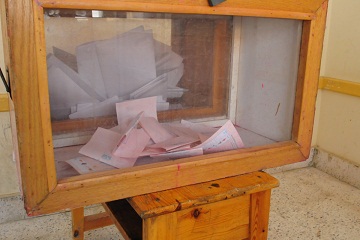CAIRO: After 30 months of shuttling between a number of Egyptian prisons, Bedouin activist Mossad Abu Fagr maintains that his experience mirrors the government’s fear of rising dissidents and its inability to understand the Bedouin culture.
In his first televised interview after being released last Tuesday, Abu Fagr discussed reasons behind his arrest, his prison experience, origins of the rift between Sinai’s Bedouins and the regime, and his hopes for the peninsula’s future.
“I saw that Sinai was approaching a cycle of violence and I wanted to create something to redirect this violence, and so I thought of spreading the idea of peaceful resistance which I think boosts people’s morale, which will in turn increase levels productivity,” he told journalist Ibrahim Eissa on ON TV.
“[However], people are a last priority to the Egyptian government,” Abu Fagr said, adding that the government crushes anyone who poses a challenge or aspire “to become an actual citizen.”
“The problem is being a writer in a place rich with resources and not a lot of people,” he added.
Abu Fagr was arrested in 2007 on charges of “inciting riots” and “damaging public property.” Rights groups say that his arrest was triggered by the fact that he was an advocate of the rights of Sinai Bedouins.
“For the regime to alienate you, it has to make to make a devil out of you,” said Abu Fagr adding that the regime has made a devil out of all Egyptians, not just the Bedouins.
Sinai’s Bedouins have often been accused of smuggling African migrants through the Israeli border, allowing weapons into the Hamas-ruled Gaza Strip and facilitating drug trade.
“They have to tarnish our image to facilitate our alienation because they don’t want anyone to hear of natural resources in Sinai,” Abu Fagr said, accusing the government of wanting to explore Sinai’s resources away from the public’s eye.
In the interview, Abu Fagr recalled a metaphor from a book by renowned Egyptian journalist Mohamed Hassanein Heikal quoting late President Anwar Sadat as saying that Sinai is a piece of bone with small amounts of meat on top — meat being the Suez Canal and petroleum industry, and the bone being the Bedouins.
“Bedouins are close in nature to camels; if you treat a camel well, it will give you everything it has got … But if you treat it with ignobility it will hold a grudge,” explained Abu Fagr, maintaining that the government has not yet been able to speak the language of the Bedouins.
He recalled meetings with tribe elders prior to his arrest where they discussed their problems and demands.
“I would tell them: ‘Do not provoke the authorities. Always make them feel that they hold power and that you’re afraid of them. If you provoke the authorities you will unleash their anger,” he said.
Abu Fagr went on to criticize the government for what he believes is a nationwide policy to look down on its people as ineffectual.
“The Egyptian people have always been putting up a fight. The fact that they haven’t achieved anything is a different story,” he said.
Abu Fagr was released on Tuesday, July 13. During his 30-month detention, he had acquired around 20 court rulings ordering his release.
“Writing while in prison turned into a scary feat. I wasn’t worried that they would read what I write, but what worries the writer is when someone reads their work before it has fully flourished,” said Abu Fagr, who is also the author of the Bedna Ne’ish (We Want To Live) blog.
On the news of his release from Abu Zaabal Prison, he said, “I heard about the release of a number of Bedouins in the past weeks… [however] when you are a prisoner in a cell, you don’t believe it when they tell you that you are going to be released.”
He was told to pack his belongings ahead of his release by two days, was transported to another facility then released in Al-Arish.
“[However], the regime does to other people more than they did to me,” he said.
Recent shootouts in Sinai have escalated tension between locals and the Ministry of Interior, which saw several meetings between both entities in an attempt to simmer tension.
Since then, around 70 Bedouin detainees have been released in line with recent amendments to the emergency laws which restrict its rule to drug smuggling and terrorism related cases.
On the recent tension, Abu Fagr said, “The natural reaction from the government at that time would have been to weaken the dissent, and it’s capable of doing that … but the more power you exert the more things get out of hand.”
“I believe that the regime is starting to think,” of how to approach the Bedouin file.
He hopes the government attends to the demands of the Bedouins by releasing the detainees, offering Bedouins land around the city of Rafah, easing security presence and reexamining cases filed against some Bedouin leaders in absentia.
Abu Farg also suggested that a new petroleum company in Sinai be headed by a Bedouin in an effort to further integrate them in society’s functions.
Despite calls by some Bedouins for their case to be handed down to an authority other than the Ministry of Interior, Abu Fagr thinks the issue should remain in the hand of the ministry, but that the army forces should interfere in moments of crisis, like during floods and famine.
He also called on the army forces to act as a “regulator,” maintaining that the Ministry of Interior lacks any form of regulation.


